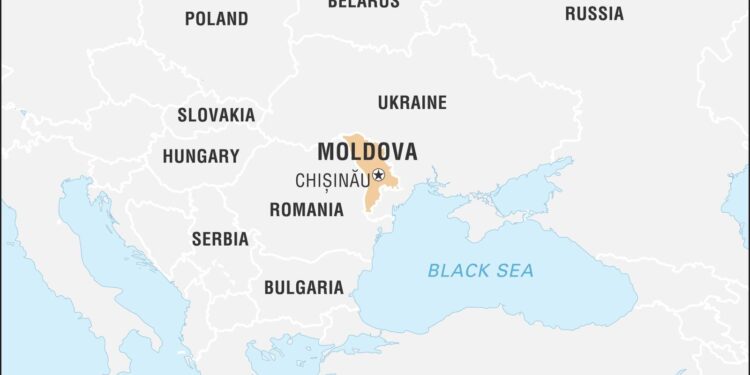As Russia’s campaign in Ukraine continues to dominate global headlines, attention is increasingly turning to Moldova, a small Eastern European nation now emerging as the next focal point in Moscow’s broader strategy to undermine the West. Situated on NATO’s doorstep and sharing a border with Ukraine, Moldova faces growing political and security challenges amid rising Russian influence and covert operations. This escalating pressure marks Moldova as a critical frontier in Russia’s ongoing assault on Western interests, with implications that extend far beyond its borders.
Moldova’s Strategic Position Challenges Western Security Framework
Nestled between the European Union and Russian spheres of influence, Moldova’s geographic location has increasingly become a flashpoint in the escalating tensions that define Eastern Europe’s security landscape. Its proximity to the breakaway region of Transnistria-a frozen conflict zone with Russian military presence-renders Moldova vulnerable to destabilization efforts that could ripple far beyond its borders. This unique position complicates the West’s ability to consolidate a cohesive security strategy as Russia intensifies its efforts to leverage Moldova as a conduit for undermining NATO and EU unity.
Several factors compound the challenge Western policymakers face:
- Energy Dependency: Moldova relies heavily on Russian energy supplies, limiting its autonomy in foreign policy decisions.
- Political Fragmentation: A deeply divided internal political landscape hampers swift alignment with Western initiatives.
- Information Warfare: Persistent disinformation campaigns aim to weaken public support for European integration.
| Factor | Impact on Security | Western Response |
|---|---|---|
| Transnistrian Standoff | Potential flashpoint for conflict escalation | Diplomatic pressure and monitoring missions |
| Economic Vulnerability | Limits resilience against coercion | Financial aid and diversification programs |
| Cyber and Info Campaigns | Erodes public trust and political stability | Counter-disinformation initiatives |
Russian Hybrid Tactics Escalate Threats Along Moldova’s Borders
The geopolitical landscape in Eastern Europe is rapidly shifting as Moscow intensifies its use of hybrid warfare techniques around Moldova’s borders. These tactics blend unconventional cyber-attacks, disinformation campaigns, and covert military movements designed to destabilize the Moldovan government and undermine Western influence in the region. Recent developments include an uptick in cyber intrusions targeting critical infrastructure and a surge in pro-Russian propaganda spread across social media platforms, creating an atmosphere of uncertainty and fear among the local population.
Key Elements of the Escalated Threat:
- Deployment of unmarked military units near Transnistria
- Covert sabotage attempts on energy supply networks
- Targeted disinformation aimed at eroding trust in Moldovan and EU institutions
- Heightened intelligence-gathering operations within Moldova
| Hybrid Tactic | Recent Activity | Potential Impact |
|---|---|---|
| Cyber Operations | Multiple DDoS attacks on government portals | Disrupt public services, reduce trust |
| Propaganda | Amplification via fake news sites and bots | Political polarization, misinformation |
| Military Presence | Unacknowledged troops in buffer zones | Intimidation, destabilization |
| Economic Pressure | Blocking gas supplies through key pipelines | Energy shortages, public discontent |
Strengthening Moldova’s Resilience Requires Increased Western Military and Economic Support
The geopolitical significance of Moldova has surged amid escalating tensions in Eastern Europe, positioning the country as a pivotal battleground in the unfolding confrontation between Russia and the West. To deter further aggression and potential destabilization, it is imperative that Western nations ramp up both military training and the provision of advanced defense equipment to Moldovan forces. Such support would not only bolster Moldova’s capability to protect its sovereignty but also send a clear message to Moscow that its expansionist ambitions will face united and resilient opposition.
Beyond security assistance, Moldova urgently requires robust economic aid to withstand external pressures and internal vulnerabilities exploited by malign actors. This encompasses targeted investments, energy diversification projects, and fiscal support designed to enhance economic stability and growth. Strengthening Moldova’s institutions and infrastructure through a multi-faceted aid package will empower it to resist subversion and become a model of resilience in the region.
- Military Support: Advanced weaponry, joint exercises, intelligence sharing
- Economic Assistance: Infrastructure funding, energy independence initiatives
- Institutional Support: Anti-corruption programs, governance reforms
| Support Area | Key Components | Expected Outcome |
|---|---|---|
| Military | Training, arms deliveries, joint drills | Enhanced defense capabilities |
| Economic | Loan packages, energy projects, trade facilitation | Economic resilience and growth |
| Governance | Public sector reform, transparency measures | Reduced corruption, stronger institutions |
Wrapping Up
As Moldova finds itself increasingly entangled in the escalating tensions between Russia and the West, the country’s strategic significance continues to grow. This unfolding situation underscores the complex geopolitical chessboard in Eastern Europe, where Moscow’s influence faces persistent challenges. Close attention to Moldova’s developments will be essential in understanding the broader dynamics shaping the region’s security landscape in the months ahead.
















